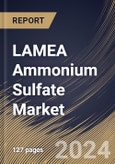There is a growing interest in exploring bio-based sources for ammonium sulfate production. Researchers and manufacturers are investigating the feasibility of producing it from renewable resources, potentially reducing dependence on traditional raw materials, and lowering the environmental footprint of the production process. The shift towards bio-based ammonium sulfate aligns with the broader economy and sustainable sourcing trend. This trend can provide an alternative and environmentally friendly route for its production if successfully implemented. Growing awareness of environmental issues and the need for sustainable practices leads to regulatory considerations in using fertilizers. Regulations related to nutrient runoff, greenhouse gas emissions, and water quality are impacting the choices made by farmers and industries in selecting fertilizers like it.
Innovation in the market includes the development of co-products and value-added formulations derived from or incorporating this. These formulations may include blends with other nutrients or additives to address specific agricultural or industrial needs. Co-products generated during the manufacturing process are explored for additional applications. The development of co-products and value-added formulations expands the versatility of this, catering to diverse market demands. It provides opportunities for manufacturers to offer customized solutions that meet specific customer requirements.
With its arid climate, Saudi Arabia has invested in agricultural technologies to enhance food security. Water scarcity is a significant challenge in Saudi Arabia. Saudi Arabia has invested in agricultural projects to achieve food security and reduce dependence on food imports. The growth of the biopharmaceutical sector in Saudi Arabia may lead to increased demand for it, which can be used in various bioprocessing steps, including protein purification. Ammonium sulfate can be part of climate-responsive agriculture strategies, helping crops adapt to the specific climatic conditions in Saudi Arabia. Thus, due to these aspects, the market will expand across the LAMEA region in upcoming years.
The Brazil market dominated the LAMEA Ammonium Sulfate Market, By Country in 2022, and would continue to be a dominant market till 2030; thereby, achieving a market value of $175.3 million by 2030. The Argentina market is showcasing a CAGR of 7.2% during (2023 - 2030). Additionally, The South Africa market would register a CAGR of 8.7% during (2023 - 2030).
Based on Product, the market is segmented into Solid, and Liquid. Based on Application, the market is segmented into Fertilizers, Food & Feed Additives, Pharmaceuticals, Water Treatment, and Others. Based on countries, the market is segmented into Brazil, Argentina, UAE, Saudi Arabia, South Africa, Nigeria, and Rest of LAMEA.
List of Key Companies Profiled
- BASF SE
- Evonik Industries AG (RAG-Stiftung)
- LANXESS AG
- SABIC (Saudi Arabian Oil Company)
- Sumitomo Chemical Co. Ltd.
- Honeywell International, Inc.
- Helm AG
- ArcelorMittal S.A.
- Akzo Nobel N.V.
- Domo Chemicals GmbH
Market Report Segmentation
By Product (Volume, Kilo Tonnes, USD Billion, 2019-2030)- Solid
- Liquid
- Fertilizers
- Food & Feed Additives
- Pharmaceuticals
- Water Treatment
- Others
- Brazil
- Argentina
- Morocco
- Chile
- South Africa
- Nigeria
- Rest of LAMEA
Table of Contents
Companies Mentioned
- BASF SE
- Evonik Industries AG (RAG-Stiftung)
- LANXESS AG
- SABIC (Saudi Arabian Oil Company)
- Sumitomo Chemical Co. Ltd.
- Honeywell International, Inc.
- Helm AG
- ArcelorMittal S.A.
- Akzo Nobel N.V.
- Domo Chemicals GmbH








